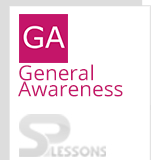 Introduction
Introduction
Polity is a very important subject for Railway Recruitment exams and UPSC Exams. SSC CPO Prelims exam is a combination of sections like General Awareness, Reasoning, Quantitative Aptitude, and English. Polity is one of the most important topics in the General Awareness section. SSC CPO Polity Quiz 2 presents the most important questions related Polity section.
 Samples
Samples
1. Which part of the Constitution describes the financial relations between Centre and States?
-
A. Part X
B. Part XI
C. Part XIII
D. Part XII
-
A. South Africa
B. America
C. Japan
D. None of the above
-
A. [latex]{31}^{st}[/latex]
B. [latex]{32}^{nd}[/latex]
C. [latex]{42}^{nd}[/latex]
D. [latex]{52}^{nd}[/latex]
-
A. 14
B. 22
C. 29
D. 28
-
A. To curb Human Trafficking and Child labour: Art. 24
B. Protection against unlawful detention: Art. 22
C. Right to Primary Education: Art. 21A
D. Equality in Employment: Art. 16
6. Which of the following statements is incorrect with regard to Directive Principles of State policy?
-
A. They have been mentioned in Article 36 to Article 51.
B. They are meant to establish social and financial democracy in India.
C. On breach of DPSP's one can go to courts for their reinstatement.
D. They are also known as social rights.
-
A. Panchayati Raj reforms
B. Land reforms
C. Appointment of Ombudsman
D. Anti Defection Law
-
A. Chief Justice
B. Advocate General
C. Vice President
D. Attorney General
-
A. If Rajya Sabha passes a resolution that this is in national interest.
B. If the Legislative assembly proves that this is legislative necessity.
C. When there is national emergency.
D. All the above
-
A. President of India
B. Chief Justice of the Supreme Court
C. Senior most member of the Lok Sabha
D. None of these
11. Which of the following statement is not correct about the Lok Sabha Speaker?
-
A. Meira Kumar and Sumitra Mahajan are the only two women Lok Sabha Speaker so far.
B. The tenure of the Lok Sabha Speaker is 5 years.
C. In total 17 persons have served as the Lok Sabha Speaker
D. Whenever Lok Sabha dissolves the speaker resigns from the post
-
A. The President of India
B. Lok Sabha speaker itself
C. Deputy Speaker of Lok Sabha
D. Prime Minister of India
-
A. He can speak and take part in the proceedings of the Lok Sabha on the matter related to his removal from the post.
B. To give a decision on any dispute related to the election of any Lok Sabha member
C. To act as the ex officio chairman of the conference of the presiding officer of the legislative bodies in the country.
D. To decide that which bill is money bill or not
-
A. President of India
B. Parliament
C. Lok Sabha alone
D. Supreme Court of India
-
A. P. A. Sangma
B. G. M. C. Balayogi
C. Shivraj Patil
D. Jagjivan Ram



